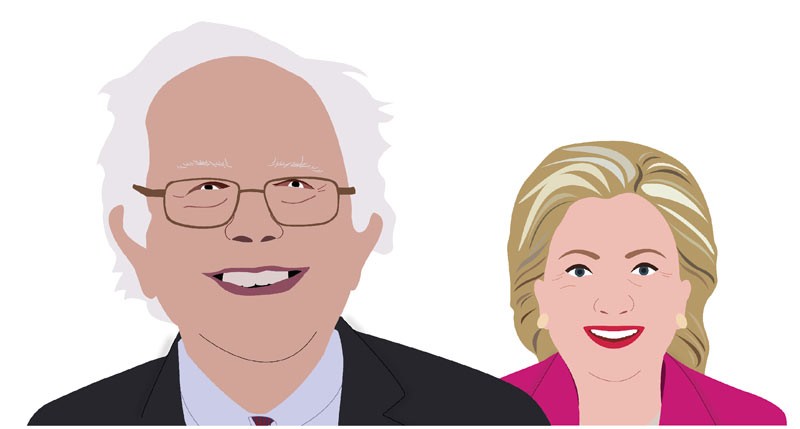
As the primary election edges closer to its end date, the three remaining presidential candidates strut their last few miles of this month-long marathon across the nation. And while Donald Trump has comfortably climbed himself up the GOP ladder — throning himself as the presumptive Republican nominee — the story on the left side of the spectrum is quite different.
Clinton’s indomitable lead continues to make a Sanders presidency less and less mathematically possible, as the former Secretary of State has managed to rack up a significant number of pledged delegates in comparison to those of the Vermont senator. And while though the likelihood of a Sanders victory has dwindled over the past few months, he has no plans to drop out of the race anytime soon — stating he’d remain in the election race “until the last vote is cast.”
The relentlessness of Sanders and his “political revolution” ideology has undeniably invoked millions of followers, as he’s continued to congregate masses of largely millennial voters, as well as many other demographics too.
But not enough people feel that same ‘bern’—and those that have, realize that.
As it’s quickly become more and more evident that Clinton will be the Democratic presidential nominee, Sanders supporters have countered this projection with the “Bernie or Bust” ideology — the notion that if Sanders does not secure the Democratic nomination, they will simply not vote in the general election.
This plan, if followed through by the majority of Sanders supporters, would undoubtedly hurt Clinton against her Republican opponent, Donald Trump.
In March, The Wall Street Journal and NBC reported in a national poll that 33 percent — one third — of Sanders supporters would not vote for Clinton in the general election. In April, that number dropped to 25 percent according the poll reported by Politico.
It’s abundantly clear that many do not find the former Secretary of State likeable; a month ago, The Washington Post reported that only 37 percent of people believed she is an honest and trustworthy candidate.
The GOP will call it Benghazi. And if not, it’s the FBI investigation of her emails. For her current rival voters — the Sanders supporters — it’s her blatant past connections to Wall Street, her casted votes for continuously sending military boots in the Middle East. It’s the fact that she’s part of — as well as at top of — the very political system Sanders wants to restructure.
Let it be clear, these opposing views and disagreements of her are not grounded in some critical truth — although some hold far more truth than others.
My disagreement is with those that compare Clinton to the same footing of real estate mogul and presumptive Republican nominee, Trump.
There aren’t many that stand by the above belief, but for those that do follow the “Bernie or Bust” mentality — this question of who would you rather have, has to come into play.
And stating ‘neither of them’ is nothing short of a cop-out.
In the past two weeks, the Republican Party has surely and slowly warmed up to their nominee.
And while Republicans like Mitt Romney and John Kasich fantasize about the prospect of a third-party nominee that could stump the two swift, blonde-haired donkey and elephant, it’s become clear whom this race is between.
And Sanders isn’t one of them.
You could blame it on a rigged voting system, you could blame it on the media blacking out your candidate, but the fact is Clinton has secured 3 million more votes than Sen. Sanders.
She won’t start a political revolution.
But I do believe that this Sanders ideology, this political revolution for reformed government, a modified political system — from fundraising to super delegates — a government full funded health insurance and tuition for public college. This ideology will continue to live on.
But not in a Trump presidency.
Perhaps, if this were any other election I could understand the notion of staying home on voting day. But it’s a different story when you have the presumptive Republican nominee declaring the strategy to deport 11 million immigrants, a halt on all Muslim travel into the U.S. and causally encouraging the idea of using nuclear weapons against our enemies — as well as providing them to other countries like Saudi Arabia and South Korea. Though in the common conservative tongue I’m learning it’s called called “telling it like it is,” and “not being offended or politically correct.”
If this weren’t an election that held a vacancy on the Supreme Court — and the possibility of more vacancies in the years to come — the “Bernie or Bust” movement wouldn’t bother me — and beyond the Supreme Court vacancies there are 87 judiciary vacancies and 60 pending nominees. These are fundamental seats and positions that will shape our nation in the years to come, and with a Trump presidency, with Trump nominated judges of the similar mindset — a Sanders political revolution would fizzle out.
The factor that populism plays the theme strings of both the Trump campaign and Sanders doesn’t take apart the fact that they are both distinctly different views of this nation.